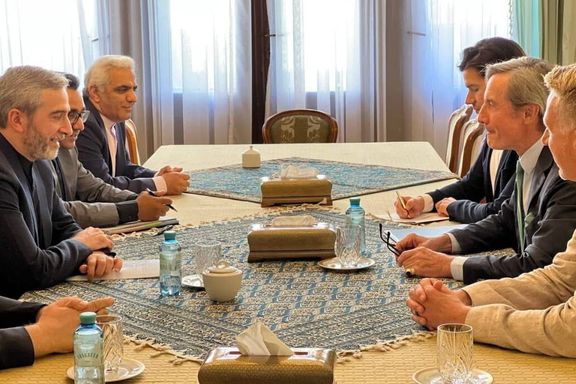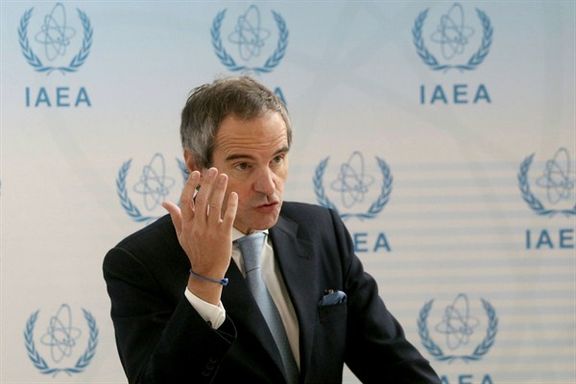Iran’s Nuclear Issue Simmering In The Background

Amid pressures over its human rights violations and crackdown on dissent, the Islamic Republic faces isolation and a serious economic crisis without a nuclear deal with the West.

Amid pressures over its human rights violations and crackdown on dissent, the Islamic Republic faces isolation and a serious economic crisis without a nuclear deal with the West.
Following about five months of constant antigovernment protests and several rounds of global sanctions, the situation has changed for Iran since negotiations to restore the JCPOA broke down in September. The Biden administration and its European allies have put the talks on the backburner and even President Joe Biden said in early November that “JCPOA is dead.” But what is the alternative for a world fraught with the threat of a nuclear Iran? Many US officials – democrats in particular – believe the Islamic Republic is bad but a nuclear Islamic Republic is even worse.
The head of the UN’s nuclear watchdog, the IAEA, has suggested an alternative agreement to the landmark accord 2015 JCPOA could break the deadlock in talks between Tehran and world powers.
Warning against adopting a defeatist approach to the signatories’ halfhearted efforts to revive the Joint Comprehensive Plan of Action at Chatham House in London on Tuesday, Rafael Grossi, director general of the International Atomic Energy Agency, said the coming weeks and months would be crucial in determining the direction the talks take.

“There has been a modification that should have been reported. You cannot go back and right this wrong. The thing is that, of course, with this modification, the facility has new capabilities so we have to inspect more,” he said referring to Fordow nuclear plant, which IAEA says requires increased inspections.
“Europe has been a very strong advocate of JCPOA... Of course, the geostrategic factors are weighing because it's not so far away and the Middle East consideration that we were mentioning is very important. I think in the case of Europe, it is very important that they continue to support us in trying to find a viable way forward — JCPOA or no JCPOA," he said.
“What we need to make sure is that we have the necessary elements to make sure that there is no proliferation, that this [nuclear] program does not cross a line. And that might be through something like the JCPOA or something else. On this I’m neutral,” he said, suggesting that he would be supporting any viable alternative to the deal. “It is the gap that worries me at this point in time because we are losing the visibility and the program continues to work. This is why I need to go to Tehran. We need to talk and we need to do it soon.”
In his State of the Union Address on Tuesday, Biden did not mention Iran; not acknowledging the Iranians demonstrating for an end to the Islamic Republic, neither mentioning the nuclear program, perhaps because the JCPOA policy has failed, and Washington has no idea for a new policy. An article in The Hill on Tuesday called on Biden to pressure US allies “to help them find the nerve and resolve to hold the regime accountable” and “to deploy the measures necessary to shake the Iranian regime.” “Efforts to isolate and punish the regime have been too slow, too weak and too disjointed to stop the carnage,” read the article.
In an opinion piece on Tuesday, Republican representative for Texas Pat Fallon denounced Biden’s Iran strategy that has been centered on reviving the nuclear deal “that enriches a murderous regime” calling it “a strategic folly.” “It is high time for an alternative strategy that takes advantage of the regime’s domestic vulnerabilities to advance US interests and to help quench the thirst of freedom for the Iranian people,” he said. “The Islamic Republic has cast a murderous shadow across the Middle East, and beyond, for decades. Even more recently, thousands of rockets with Iranian origins have rained down on Israeli civilians, with over 100,000 more waiting in Hezbollah’s arsenal. Fanning the flames of civil wars in Syria and Yemen, Iran has established a ring of fire around US partners in the Middle East. Today, the same Iranian weapons used in the Middle East directly threaten European security,” Fallon wrote.
Iranian Australia-based academic Alam Saleh believes that the alternative for a deal with Iran is war and an atomic Iran. He told Etemad daily in Tehran that any agreement is better than no agreement, although even in case of reaching a deal, major Western companies might hesitate to enter the Iranian market as investment would be a risky proposition. "Neither Iran, nor the United States have a plan B that would replace an agreement. An all-out war is the only thing that can replace an agreement and a war is most likely to lead to the emergence of a nuclear Iran."
Given the status of Iran’s domestic and foreign politics, mired with rising inflation and public uproar, the Islamic Republic may give up some of its demands and sit at the negotiation table with a more cooperative spirit this time around.